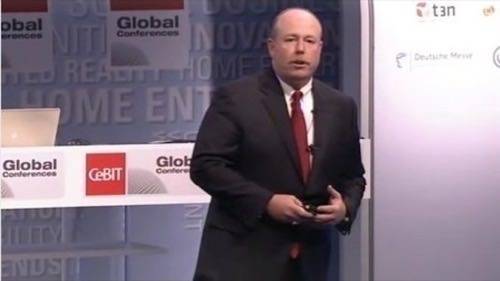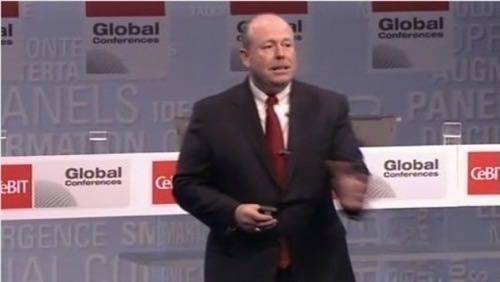
CIOs and managers who answer to CIOs attended the keynote sessions at the CeBIT conference in Hannover yesterday expecting Microsoft to explain to them, for the first time, where the business value in Windows 8 will come from. What they got may have been a bit of a shock: It was a demonstration of all the new Windows 8 features that Microsoft expects consumers to flock to in high numbers.
It was followed by this argument, by the company’s Chief Operating Officer, Kevin Turner: Employees will be bringing devices into the workplace that run Windows 8, whether it wants them or not. Running Windows 8 will be as simple as plugging in a USB stick, even in a Windows 7 machine. So enterprises had better “get ahead” now, and embrace the wave rather than try to repel it.
“When you think about the opportunity that we have with big data, we also see an explosion as it relates to the consumerization of IT,” Turner told CeBIT attendees. “What we see within the consumerization of IT is the ability to have a tremendous digital work style really get married with the convergence, basically, of a digital lifestyle.”
It was this conjugation, if you will, that set the theme for Microsoft’s entire presentation: Since employees want to do what they want to do, there’s no point in trying to stop them. Turner said his company’s new System Center 2012 management tool will incorporate new cloud-based features that give administrators control over both virtualized devices and heterogeneous devices – meaning, not necessarily Windows.

“So you can see, we’ve approached the management with System Center 2012 in a secure way from many different angles, all of which empower the CIOs to satisfy their user expectations, while balancing the enterprise requirements, and the fiscal requirements that go with it,” the COO added.
It was a subtle acknowledgement that Apple’s iPad has blazed a trail for consumer-class devices in enterprise scenarios. For the past three decades, much of Windows’ success in the home has stemmed from its ubiquity in the workplace, and the fact that workers need to take their Windows work home. Now with iPad reversing the wind flow, Microsoft finds itself facing the stark, new realities of climate change.
So Kevin Turner’s suggestion to CeBIT attendees was to let climate change happen, in hopes that Windows 8 can draft its way behind the consumer trend leader.
Turner painted a picture of the role of the CIO shifting from the IT manager to the business manager, answering the needs of an employee base made up of consumers whose personal technology already exceeds the capability and quality of what most businesses have installed in their networks now. Said Turner: “If you look at the trends, whether it’s cloud or consumerization of IT, and the data explosion that we talked about, you’re going to notice that there’s one thing in common: They’re mostly being driven by end users, and the ability to get in front of that is the real challenge that we see for CIOs and for enterprises. Which is why more and more IT solutions are being built from the end user backwards, versus the business and the system out. That’s something, again, we continue to see in a very, very profound way.”

















